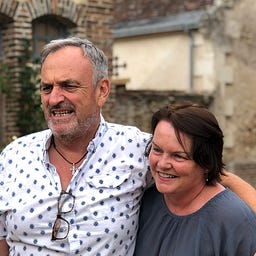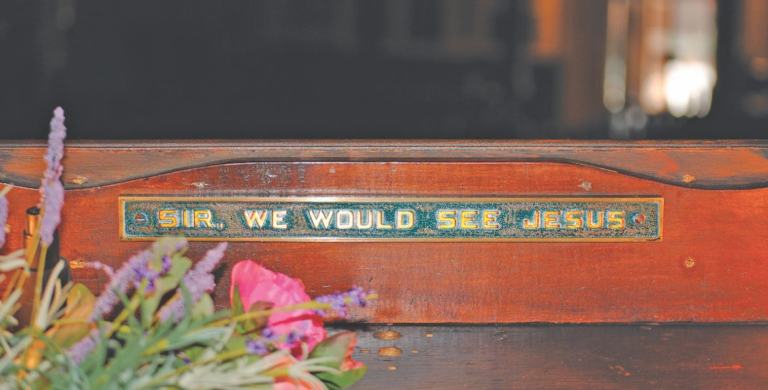A is for Adam
Also in this Edition
From the Archive – Born Again, Again
Video Poem – Freedom’s Slave

“Two households, both alike in dignity,
In fair Verona, where we lay our scene
From ancient grudge break to new mutiny,
Where civil blood makes civil hands unclean…”
William Shakespeare, Romeo and Juliet
The opening words of the Bard’s greatest romantic tragedy take the form of a prologue. As was the norm of the day, a single actor takes the stage to tease us with a taste of all that is to come.
The prologue goes on…
“From forth the fatal loins of these two foes a pair of star-cross’d lovers take their life; Whose misadventured piteous overthrows do with their death bury their parents’ strife. The fearful passage of their death-mark’d love, and the continuance of their parents’ rage, which, but their children’s end, nought could remove, is now the two hours’ traffic of our stage…”
Knowing what you almost certainly know about the story of Romeo and Juliet, isn’t it remarkable just how much of the narrative the playwright manages to hint at in these few short lines. As soon as our informant has left the stage we know more or less what we are dealing with – a deep and escalating conflict between two rich and established families; two young people, one from each side, who will fall in love; their passion doomed from its very beginning to end in death; and their deaths, in turn, the only thing that can end the wider conflict.
The prologue has done its job. It has told us what to look out for; what to expect. It has whetted our appetite to see just how Shakespeare will handle these themes. How will the conflict unfold? When will the lovers meet? Why, oh why, must they die? Before we’ve even met the cast we are already on the edge of our seats. Like the best trailer for a blockbuster movie or streaming series, the prologue makes us want to know what happens next. It pulls us into the story, and urges us to stay to the end – even whilst warning us that it will take two hours to get there!
Here’s another prologue that tells us what a great and lengthy story is going to be about…
A good and benevolent king creates a beautiful garden, placing in it all the most exotic and pleasing plants and animals. It is, quite literally, a paradise. Into this world of abundance, he places two people, one male, one female, urging them to love each other, to grow a family and to live well in the idyll he has made for them. Tragically, they do not trust their benefactor, and instead of following his counsel they go behind his back to seize control for themselves of the territory he has given them. Heartbroken, the king comes looking for them – wanting nothing more than to walk with them in the garden – only to find they are hiding from him, trading trust for fear and confidence for shame. They still have a life to live though; a garden to care for; a family to build. What will happen now, with the trust so essential to their thriving so tragically and permanently shattered…?
This is, more or less, the way the drama of our scriptures opens. It is the Genesis, the beginning, of the story we find ourselves in. Reading it as a prologue, what does it suggest to you that the later story might turn out to be about? What will you be looking out for in the many centuries’ ‘traffic of our stage’ that follows? Allow me to make three suggestions.
Firstly, you will be wondering what kinds of mess the now-not-trusting garden dwellers might get into. How deeply will the loss of trust, the break in relationship, impact their ability to manage and govern the garden, and to spread its goodness into the wilderness beyond its walls? What strange fruits will grow from their act of mutiny? (Spoiler alert – you won’t have to wait too long to find out.)
Secondly, you will be wondering how the King might respond. So far in our story he has shown himself to be good and kind. His intentions, it seems, are for their benefit – he wants them not only to survive but to thrive. But what now? Will he simply tolerate their compromised capacities and somehow adapt his plans accordingly, or can he – will he – find a way to mend the relationship, to get them back on track to his original plan?
Thirdly you will be asking how will this story end? Will mutiny have the last word, or trust; separation or reunion? Will the garden ever fulfil its potential? Are we heading deeper into tragedy, or is their joy yet to be discovered?
And there, in a nutshell, is the story the Bible tells. It is, profoundly and completely, the human story. What will become of the Sons of Adam and the Daughters of Eve as they wrestle with their own fears and shame? Can they find their way back into a bond of trust with the King? Will they? And what of his relationship with them? Will he hate them? Reject them? Judge them? Destroy them? Or will he find it in his heart to pursue them; to woo them back into the place of innocence they once held?
Aaron Sorkin, the writer behind The West Wing, The Social Network and many other great TV and movie scripts, insists that all great drama is built on a single tension – that between intention and obstacle.
“Rather than tell the audience who the character is,” he says. “I like to show the audience what a character wants. It all boils down to intentions and obstacles: somebody wants something and something is standing in their way of getting it. They want the girl, they want the money, they want to get to Philadelphia — it doesn’t matter, but they have to want it bad. Something formidable is standing in their way, and the tactics that character uses to overcome the obstacle is going to define who the character is.”
What if this is not just a guide to great storytelling, but also a way to read the Christian scriptures? What if our prologue is telling us what God wants and what stands in the way of him getting it, and the rest of the narrative – from Abraham and Sarah to the Apostle John’s pearly gates – is about the lengths he will go to to overcome the obstacle? If this is the case we know what it is that God wants: he wants to walk with the people he has made in the place of beauty he has made for them, and we know that he will move heaven and earth to achieve that goal. Reconciliation; reconnection; resolution – reunion is the beating heart of the story the Bible tells. If you’re in any doubt about this, read again the first three chapters of Genesis, then leap over everything in-between to land on the declaration of Revelation 21:3
“ I heard a loud shout from the throne, saying, “Look, God’s home is now among his people! He will live with them, and they will be his people. God himself will be with them. He will wipe every tear from their eyes, and there will be no more death or sorrow or crying or pain. All these things are gone forever.”
When did death arrive on the scene? Partway through our prologue, along with fear and shame and the sorrow and crying and pain that came with them. When does death finally leave the stage? A few verses into the penultimate chapter of the whole drama, just minutes before the final curtain falls. God at last gets what he wants, and has always wanted: to be with the people he has made in the garden he has made for them. Back in Romeo and Juliet, you could, should you wish to, read the prologue and then flip over to the final pages, to see if the promised truce between the families is realised. (Spoiler alert 2: It is – the opposing fathers shake hands and agree to each build a statue in honour of the other’s child.)
In the same way, you can read the questions raised in Genesis 1-3 and fast-forward to Revelation 21 to see them answered. Everything in between is about the how – how bad things get as the mutiny gains momentum; how the King works, day and night, to forge reunion. How he never wavers from his original intention and goal. The incarnation of God’s Son, at the centre of the narrative, is the high point of the how. It is a unique, unexpected and remarkable turn in the story – but it is the same story. The questions raised by our prologue still hang over the stage. What will the King do? How will his people respond? Will there be reunion?
The significance of reading the Bible’s narrative in this way is that it tells us not only what the story is about but who it is about. This is Adam and Eve’s story, played out in the lives of their sons and daughters. It is the human story. The most pressing question the scriptures ask, repeated more or less on every page, is this: will the sons of Adam and the daughters of Eve be reconciled to the king? No other theme in scripture matters more. Joni Mitchell wrote in Woodstock in 1969 “…we’ve got to get ourselves back to the garden.” Except that we can’t get ourselves there. We need the King to intervene, and we need to trust him when he does. Only reunion will get the garden back on track, which is why reunion is the relentless, overwhelming theme of God’s side of the story, and the heart and core of the ministry of Jesus.
Our problem is that for most of the history of the church – at least its last 15 centuries or so – we haven’t tended to see the Bible’s narrative as a human story at all. “Humanism” is assumed, by definition, to exclude belief in God and, therefore, in any religious text,
“Humanism derives the goals of life from human need and interest rather than from theological or ideological abstractions, and asserts that humanity must take responsibility for its own destiny.”
https://americanhumanist.org/what-is-humanism/definition-of-humanism/
Humanists, in order to create a narrative centring on human activity and looking toward human thriving, have felt the need to distance themselves from the church, its God and its sacred texts. Their assumption is that the church holds an essentially negative view of the human condition. But what if our sacred texts are centred on human activity and do look toward human thriving? What if in their reading of scripture they have missed its high view of human identity; its passionate belief in human potential? It is ironic that the pages that hold what is almost certainly the highest view of human nature and responsibility of any ancient texts, and the greatest hope of human thriving, have been rejected by those seeking a human-centred story. The Genesis narrative stands out from parallel creation myths of its time in the place it holds for human beings – in the respect and honour with which the creators treats his creatures. It describes an ordered world in which human beings have agency and purpose, not as victims of capricious gods but as the dignified co-regents of the world’s King. You could almost call it, in its context, a humanist text.
To be clear, I’m not laying the blame for this mis-reading of scripture on the humanists, but at the door of the church. If we had more accurately represented and embodied the very high view of humanity our texts actually point to, it is quite possible that some of those who have bound humanism to atheism (or at least to agnosticism) might not have felt the need to do so. This is certainly true in France, where I have lived for the past fifteen years. A little over two centuries ago a revolutionary generation of citizens coalesced around a longing for ‘Liberty, Equality and Brotherhood’. They were a diverse bunch, with roots in a whole range of philosophies and worldviews, but in one key area they were united: they did not see these values represented in any measure by the churches of their day. So was born a deep conviction that persists in France to this day: the road to human thriving leads not into and through the realm of faith but around it and away from it. Faith persists, but it is private; personal. It has nothing to say to the pressing public issues of human society. If you want a soul story, read your bible. For the human story, look elsewhere.
Human. Humanity. Humanist. These are all terms that should never be far from our minds as we read the multiple narratives that make up the library of scripture. This is the story we are being told. If there was ever any doubt of this reality (as there is to this day for many) it is vaporised by the event that marks the crowning glory of the whole adventure: the incarnation of the Son of God, when the divine ruler chooses not only to walk alongside the Sons of Adam but to become the Son of Adam (a phrase rendered in most anglophone Bibles as ‘the Son of Man’). This is history’s greatest and most heartfelt affirmation of the human condition. It changes everything. It affirms that being human is not only a “good, very good” (Genesis 1:31) idea: it’s an idea good enough for God to adopt as his own identity. Forever.
So we have before us a human story. It’s the story of Adam and Eve, played out in the lives of their descendants. And it’s the story of a King so kind, so loving, so completely committed to human thriving that he will go to the ends of the earth to be reconciled to the sons and daughters of those first, trembling creatures he so loved.
A connoisseur of books is a bibliophile. A collector of teddy-bears is an arctophile. A discophile obsesses over records. God, by the same token, is a humanophile. He knows people; loves people; seeks out people. Collects people. To celebrate human beings is to share the mind of God. In God’s Plan A, the A is for Adam.
From: Gerard Kelly,The Seven Stories that Shape Your Life, © 2016 Lion Hudson
I tried to place myself, naked, poor and alone, in the presence of God’s eternal majesty.
CARLO CARRETTO
If worship calls us to encounter God, to meet him in the deepest of intimacy in the nakedness of a surrendered heart, then it will ask of us at times to set aside the clutter of our lives. Even our religious jumble, gathered over years of trying to worship, can get in the way. What we need, in Jesus’ words, is to be born again.
There is a story told of Mahatma Gandhi meeting for the first time King George V of England,
Gandhi had spent much of his adult life resisting British rule in India, so his trip to London in 1931 was significant. He visited 10 Downing Street before being taken to Buckingham Palace to be presented to His Majesty. The king, as might be expected, was decked out in the formality and finery of his office. Gandhi, by contrast, wore only his habitual loincloth and shawl – he was dressed no differently from how he would be for a walk through the poorest district of Calcutta. After the meeting a journalist asked the exotic visitor if he had been embarrassed to be so underdressed in the presence of the king. “Not at all”, Gandhi replied with a smile. “His Majesty was wearing quite enough for both of us.”
We don’t know very much about Nicodemus, but we do know that he enjoyed a high social status. He was wealthy, powerful, and well-educated. He held a position of respect in the religious and political establishment of his day. We also know that he was conscious enough of his rank to require a secret, night-time meeting in order to speak to Jesus. This is a man who wore his status like a uniform: an instantly recognizable minor celebrity. Jesus, by contrast, was poor and had little formal education. At this stage in his public ministry he was almost certainly homeless, relying on the charity of friends like Lazarus and Joanna, whose husband worked in the household of King Herod. Nicodemus the professor meets with Jesus the couch-surfer, and guess who turns out to be cleverer?
The conversation centres on two linked themes: new birth and the ministry of the Holy Spirit. This is the passage that has given us the phrase “born again” and spawned a whole movement of twentieth-century evangelists. It is highly unlikely, of course, that “born again” when Jesus introduces the idea to Nicodemus has anything at all to do with “born again” in the way our TV evangelists suggest. For a start, there were no evangelicals in Jesus’ day and the concept of conversion as we know it simply didn’t exist. Using “born-again Christian” as a label for a particular way of pursuing the faith may have some sociological usefulness, but it bears little relation to this passage. What, then, is Jesus talking about? Like Gandhi before King George, he is talking about the sheer weight of the clothing Nicodemus has allowed his faith to be buried under, and the nakedness that is the prerequisite for worship. The religion of Nicodemus; his education; his prosperity; his social standing – all these have become fashion accessories, badges, and medals to be worn for all the world to see. Jesus is interested in what’s underneath. Who is Nicodemus without all these things? Stripped of his sophistication and cleverness, who might this old man really turn out to be?
To truly experience the presence of God, Jesus says, we must come to him as a newborn baby – naked, uneducated, carrying neither wealth nor status. We must set aside the tools and tricks we have spent so long acquiring, and simply let God love us as we are.







